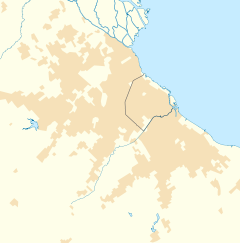Tigre, Buenos Aires
This article needs additional citations for verification. (May 2015) |
Tigre | |
|---|---|
 Aerial view | |
Location in Greater Buenos Aires | |
| Coordinates: 34°25′S 58°35′W / 34.417°S 58.583°W | |
| Country | |
| Province | |
| Partido | Tigre |
| Elevation | 2 m (7 ft) |
| Population (2010 census) | |
| • Total | 31,106 |
| CPA Base | B 1648 |
| Area code | +54 11 |
Tigre (Spanish pronunciation: [ˈtiɣɾe], Tiger) is a city in the Buenos Aires Province, Argentina, situated in the north of Greater Buenos Aires, 28 km (17 mi) north of Buenos Aires city. Tigre lies on the Paraná Delta and is a tourist and weekend destination, reachable by bus and train services, including the scenic Tren de la Costa. It is the main city and administrative centre of the Tigre Partido.
History
[edit]The area's name derives from the "tigers" or jaguars that were hunted there, on occasions, in its early years. The area was first settled by Europeans who came to farm the land. The city sits on an island created by several small streams and rivers and was founded in 1820, after floods had destroyed other settlements in the area, then known as the Partido de las Conchas. The port developed to serve the delta and to bring fruit and wood from the delta and ports upstream on the Paraná river. Tigre is still an important timber processing port.
Transportation
[edit]Road
[edit]Tigre is connected to the capital by a spur, the Ramal Tigre, off the main Route 9 highway.
Rail
[edit]
The city of Tigre is served by two railway lines, the Mitre Line and the Tren de la Costa, both terminate within walking distance of the city centre.
- Mitre Line
- Retiro – Tigre (direct service)
Mitre Line trains depart from Buenos Aires Retiro Station to Tigre Station every 10 – 30 minutes.
- Mitre Line / Tren de La Costa
- Retiro – Olivos – Delta
Trains run from Retiro to Bartolomé Mitre station in Olivos, with a footbridge connection to Maipú station of the Tren de la Costa
River
[edit]
Inter-island public transport in the delta is catered for by traditional-styled mahogany commuter launches.
Tourism
[edit]
Tigre is a tourist and weekend destination, reached by bus and train services, including the Tren de la Costa.
The former “Puerto de Frutos”, or fruit market, is now a crafts fair located by the riverside. Attractions include antiques shops, riverside restaurants and bars, the casino, the Parque de la Costa, an amusement park, and its natural environment which make Tigre a tourist destination throughout the year.[citation needed] There are small hotels and upscale lodges, restaurants, teahouses and picnic sites.[citation needed]
English-style rowing clubs, a number of marinas, dwellings and mansions from the “Belle Époque”, such as the Tigre Club,[1] are in the area. The Tigre Club building is now the Museo de Arte Tigre, housing an extensive collection of Argentine art.[2] The Argentine Naval Museum, nearby, features items from Argentine naval history with an emphasis on the Guerra de las Malvinas. It also has the log-book from HMS Beagle. There is also a museum dedicated to mate.
Tigre is the starting point for a visit to the Paraná Delta. A number of companies offer sightseeing trips through its inter-connecting rivers and streams, some extending as far as Martín García Island.
Gallery
[edit]-
Log boat, Rio Paranacito II approaching Tigre
-
River bus Jilguero at the boat station
-
Mitre Railway Tigre Station
-
The Fruit Market in 1902
-
Tigre Station, inside
-
Tigre Station, outside
-
Tigre River
-
Argentine Rowing Club
-
Buenos Aires Rowing Club
-
La Marina Rowing Club
-
Railway station, c. 1900
-
Sarmiento statue at the Boat Station
-
Tigre Art Museum ("Museo de Arte Tigre")
See also
[edit]References
[edit]- ^ In Argentina, Touring the Tigre Delta New York Times. 24 November 2010
- ^ Salegh, Diana (2010). Museo De Arte Tigre: su historia, su colleción. Buenos Aires: Museo De Arte Tigre. pp. 6–56. ISBN 978-987-26384-0-5.
External links
[edit]- Official Municipality web site (Spanish/English)
- Official travel site (Spanish/English)
- Victorica Promenade (Spanish)















